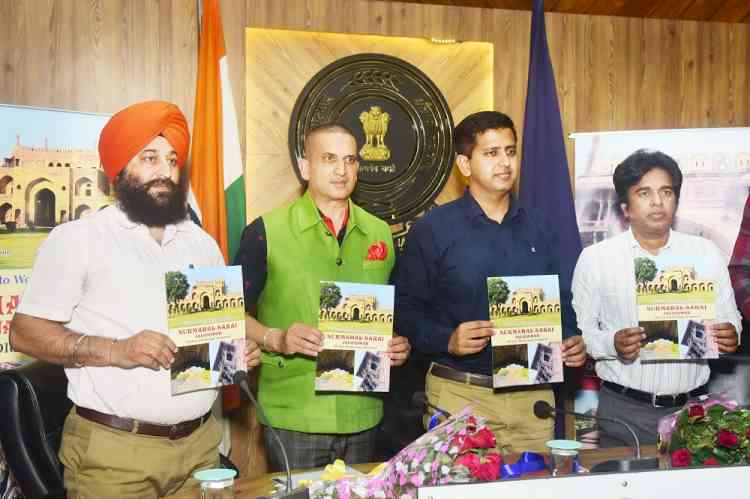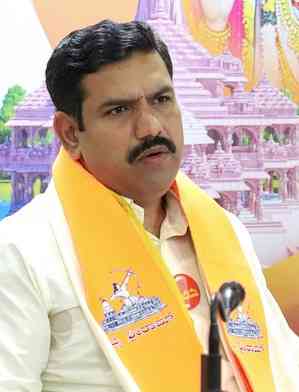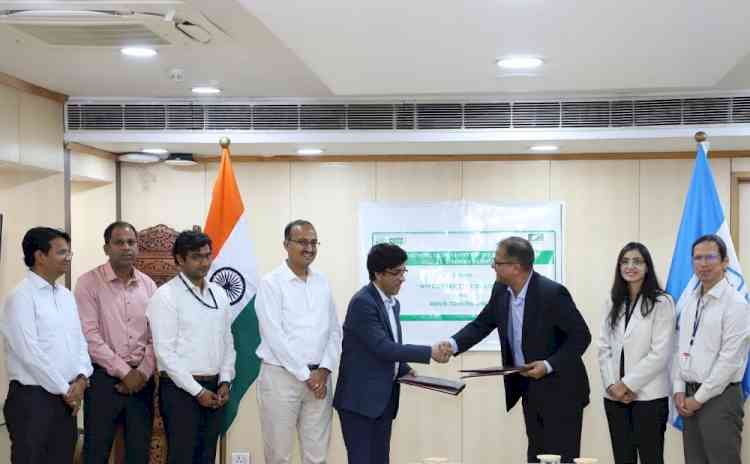National symposium on farm diversification begins at PAU
Author(s): Charanjit Singh SalujaThe photograph taken during national symposium on farm diversification at PAU, Ludhiana on Tuesday. Ludhiana, November 18, 2014: A national symposium on “Agricultural Diversification for Sustainable...


The photograph taken during national symposium on farm diversification at PAU, Ludhiana on Tuesday.
Ludhiana, November 18, 2014: A national symposium on “Agricultural Diversification for Sustainable Livelihood and Environmental Security” began at the Punjab Agricultural University (PAU) today amidst a gathering of eminent farm scientists and delegates from across the country. The three-day symposium has been jointly organized by PAU and Indian Society of Agronomy (ISA). Padma Bhushan, Dr R.S.Paroda, Chairman, Trust for Advancement of Agricultural Sciences, and Ex-Director General, Indian Council of Agricultural Research (ICAR), New Delhi was the chief guest.
In his remarks, Dr Paroda pointed out that natural resources are dwindling and land availability is shrinking. People below poverty line are dependent on small resources, he said. “We don’t want pesticides and fertilizers to be used injudiciously, green house gas emissions to emerge and natural resources to be exploited in excess,” he added. “The need of the hour is to adopt foresight approach, re-reorient research agenda, conduct innovative and farmer’s participatory research, and provide low-cost and less input requiring technology to the farmers,” he said. Further, Dr Paroda expressed that crop diversification is essential for livelihood of small and marginal farmers, and that horticulture, floriculture, beekeeping, livestock, fishery and poultry need to be taken up. “Gujarat and Madhya Pradesh are known for groundnut and soybean production,” he highlighted, while suggesting inclusion of legumes and spring maize for diversification. In view of climate change, soil health and water issues, need for good agronomic practices (GAP) for sustainable agriculture are becoming equally important these days, he observed.
The Guest of Honour, Dr Panjab Singh, President, Foundation for Advancement of Agriculture and Rural Development, and Ex-DG, ICAR said, “We are the largest producers of natural resources. But how to sustain the resources is a biggest challenge as climate change can turn the tables.” Production system has to fight against the odds of climate change and declining resources, he observed.
Another Guest of Honour, Dr J.S. Samra, CEO, National Rainfed Area Authority, Government of India stressed, “Be innovative and think out of box.” He said that diversification should be across the disciplines and on a big scale. “Make in India” mission, launched by India’s Prime Minister, Narendra Modi, is going to be a real challenge for all sectors including agriculture, he added. China and Australia are going to pose tough competition in plantation crops, he told, saying that competition in solar and wind energy is also seen in near future.
In his presidential remarks, Dr Baldev Singh Dhillon, Vice-Chancellor, PAU said that we have made tremendous advancement in agriculture. Although productivity is being enhanced, yet there has been three-times increase in the use of agro-chemicals in Punjab and Haryana during last three years, he revealed. “To tackle the issues of climate change and depleting natural resources; multi-dimensional expansion of research, studying ecological consequences, doing introspective analysis, and human resource development are key factors,” he said.
Earlier, Dr Gurbachan Singh, Chairman, Agricultural Scientists Recruitment Board, and President of ISA welcomed the dignitaries, delegates and the gathering. He said that retaining youth in agriculture, and livelihood security of small and marginal farmers are the major challenges. There is a need to work together in a multi-disciplinary mode, he said. Remarking that diversification is the need of the hour, Dr Singh suggested making multiple use of resources through multi- enterprise agriculture system. Later, he said, “Agronomy will feed the world.”
Dr D.S. Rana, Secretary, ISA highlighted the activities and initiatives, taken by the society. About ISA, he said it is one of the largest scientific societies of the country, which aims at disseminating knowledge on agronomy.
Dr G.S. Buttar, Head, Department of Agronomy, PAU and Organising Secretary of the symposium, proposed the vote of thanks.
On the occasion, Dr T.S. Lamba, Dr Ambika Singh and Dr Arvind Kumar were awarded ISA Life Time Achievement Award. Besides, seven scientists received ISA Gold Medal, 16 ISA Fellow, two best Ph.D thesis and two best M.Sc thesis awards, two best research paper awards and one P.S. Deshmukh Young Scientist Award. Eight publications were released by the dignitaries. An exhibition was also put up various departments of the University.
Readers may send their news/views/feedback to us:
Date:
Tuesday, November 18, 2014

 cityairnews
cityairnews 
















